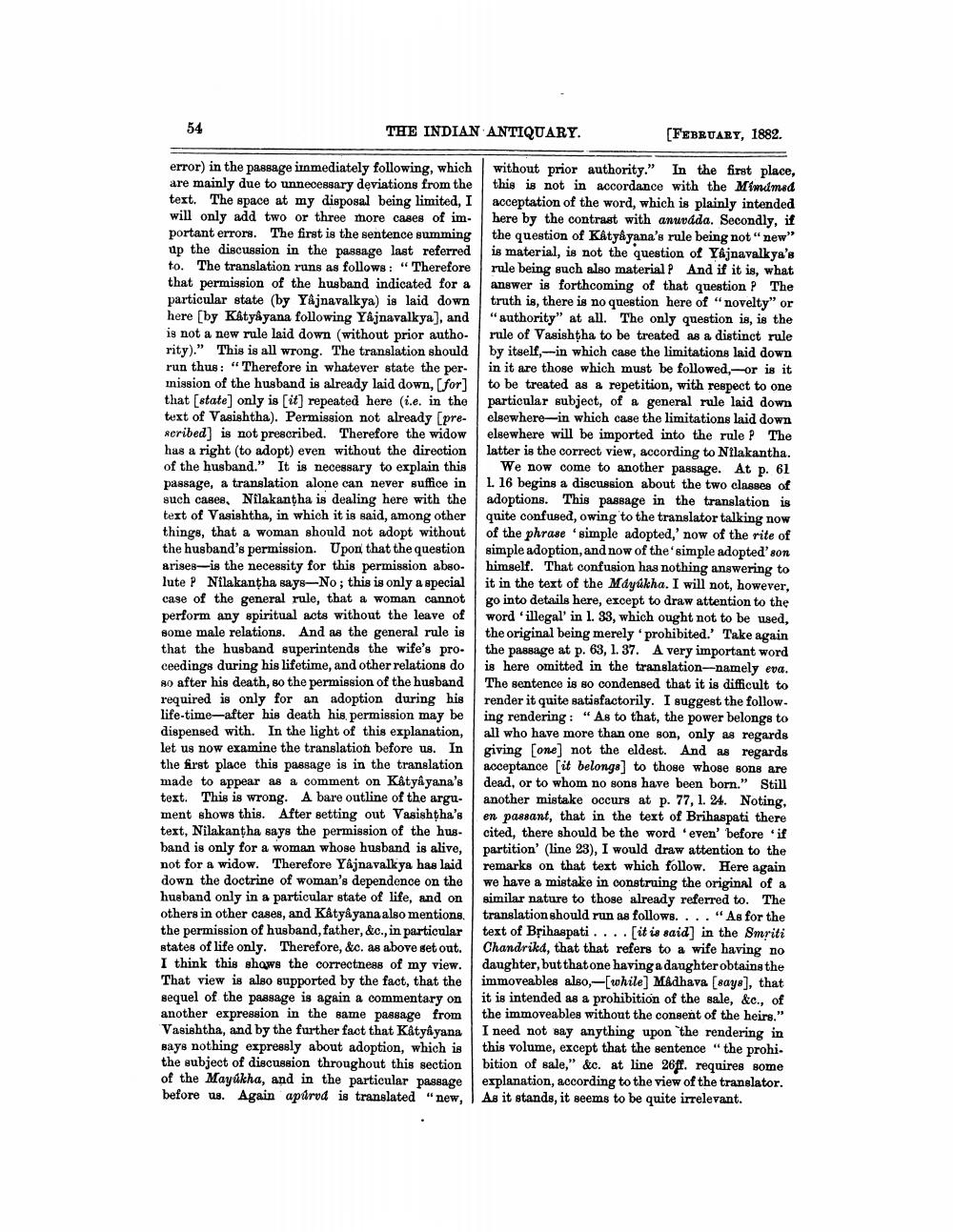________________
54
THE INDIAN ANTIQUARY.
error) in the passage immediately following, which are mainly due to unnecessary deviations from the text. The space at my disposal being limited, I will only add two or three more cases of important errors. The first is the sentence summing up the discussion in the passage last referred to. The translation runs as follows: "Therefore that permission of the husband indicated for a particular state (by Yajnavalkya) is laid down here [by Katyayana following Yajnavalkya], and is not a new rule laid down (without prior authority)." This is all wrong. The translation should run thus: "Therefore in whatever state the permission of the husband is already laid down, [for] that [state] only is [it] repeated here (i.e. in the text of Vasishtha). Permission not already [prescribed] is not prescribed. Therefore the widow has a right (to adopt) even without the direction of the husband." It is necessary to explain this passage, a translation alone can never suffice in such cases, Nilakantha is dealing here with the text of Vasishtha, in which it is said, among other things, that a woman should not adopt without the husband's permission. Upon that the question arises is the necessity for this permission absolute ? Nilakantha says-No; this is only a special case of the general rule, that a woman cannot perform any spiritual acts without the leave of some male relations. And as the general rule is that the husband superintends the wife's proceedings during his lifetime, and other relations do so after his death, so the permission of the husband required is only for an adoption during his life-time-after his death his permission may be dispensed with. In the light of this explanation, let us now examine the translation before us. In the first place this passage is in the translation made to appear as a comment on Kâtyâyana's text. This is wrong. A bare outline of the argument shows this. After setting out Vasishtha's text, Nilakantha says the permission of the husband is only for a woman whose husband is alive, not for a widow. Therefore Yâjnavalkya has laid down the doctrine of woman's dependence on the husband only in a particular state of life, and on others in other cases, and Kâtyâyana also mentions. the permission of husband, father, &c., in particular states of life only. Therefore, &c. as above set out. I think this shows the correctness of my view. That view is also supported by the fact, that the sequel of the passage is again a commentary on another expression in the same passage from Vasishtha, and by the further fact that Kâtyâyana says nothing expressly about adoption, which is the subject of discussion throughout this section of the Mayúkha, and in the particular passage before us. Again apúred is translated "new,
[FEBRUARY, 1882.
without prior authority." In the first place, this is not in accordance with the Mimimed acceptation of the word, which is plainly intended here by the contrast with anuváda. Secondly, if the question of Katyayana's rule being not "new" is material, is not the question of Yajnavalkya's rule being such also material? And if it is, what answer is forthcoming of that question? The truth is, there is no question here of "novelty" or "authority" at all. The only question is, is the rule of Vasishtha to be treated as a distinct rule by itself,-in which case the limitations laid down in it are those which must be followed, or is it to be treated as a repetition, with respect to one particular subject, of a general rule laid down elsewhere-in which case the limitations laid down elsewhere will be imported into the rule? The latter is the correct view, according to Nilakantha.
We now come to another passage. At p. 61 1. 16 begins a discussion about the two classes of adoptions. This passage in the translation is quite confused, owing to the translator talking now of the phrase 'simple adopted,' now of the rite of simple adoption, and now of the 'simple adopted' son himself. That confusion has nothing answering to it in the text of the Máyúkha. I will not, however, go into details here, except to draw attention to the word 'illegal' in 1. 33, which ought not to be used, the original being merely prohibited.' Take again the passage at p. 63, 1. 37. A very important word is here omitted in the translation-namely eva. The sentence is so condensed that it is difficult to render it quite satisfactorily. I suggest the following rendering: "As to that, the power belongs to all who have more than one son, only as regards giving [one] not the eldest. And as regards acceptance [it belongs] to those whose sons are dead, or to whom no sons have been born." Still another mistake occurs at p. 77, 1. 24. Noting, en passant, that in the text of Brihaspati there cited, there should be the word 'even' before 'if partition' (line 23), I would draw attention to the remarks on that text which follow. Here again we have a mistake in construing the original of a similar nature to those already referred to. The translation should run as follows. . . . "As for the text of Brihaspati.... [it is said] in the Smriti Chandrika, that that refers to a wife having no daughter, but that one having a daughter obtains the immoveables also,-[while] Madhava [says], that it is intended as a prohibition of the sale, &c., of the immoveables without the consent of the heirs." I need not say anything upon the rendering in this volume, except that the sentence "the prohi bition of sale," &c. at line 26ff. requires some explanation, according to the view of the translator. As it stands, it seems to be quite irrelevant.




